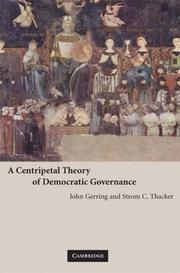| Listing 1 - 1 of 1 |
Sort by
|

ISBN: 9780521710152 9780521883948 0521710154 9780511756054 9780511409882 0511409885 0511409346 9780511409349 0521883946 9780511407987 051140798X 0521883946 0511756054 1107185998 1281717053 9786611717056 0511407246 0511408773 9781107185999 9781281717054 6611717056 9780511407246 9780511408779 Year: 2008 Publisher: Cambridge : Cambridge University Press,
Abstract | Keywords | Export | Availability | Bookmark
 Loading...
Loading...Choose an application
- Reference Manager
- EndNote
- RefWorks (Direct export to RefWorks)
This book outlines the importance of political institutions in achieving good governance within a democratic polity and sets forth an argument to explore what sorts of institutions do the job best. By focusing on 'centripetal institutions', which maximize both representation and authority by bringing political energy and actors toward the centre of a polity, the authors set forth a relatively novel theory of democratic governance, applicable to all political settings in which multi-party competition obtains. Basing their theory on national-level political institutions, the authors argue that there are three types of political institutions that are fundamental in securing a centripetal style of democratic governance: unitary (rather than federal) sovereignty, a parliamentary (rather than presidential) executive, and a closed-list PR electoral system (rather than a single-member district or preferential-vote system).
Government --- Political philosophy. Social philosophy --- Democracy. --- Political science. --- Démocratie --- Science politique --- Démocratie --- Administration --- Civil government --- Commonwealth, The --- Political theory --- Political thought --- Politics --- Science, Political --- Social sciences --- State, The --- Self-government --- Political science --- Equality --- Representative government and representation --- Republics --- Social Sciences --- Political Science
| Listing 1 - 1 of 1 |
Sort by
|

 Search
Search Feedback
Feedback About
About Help
Help News
News